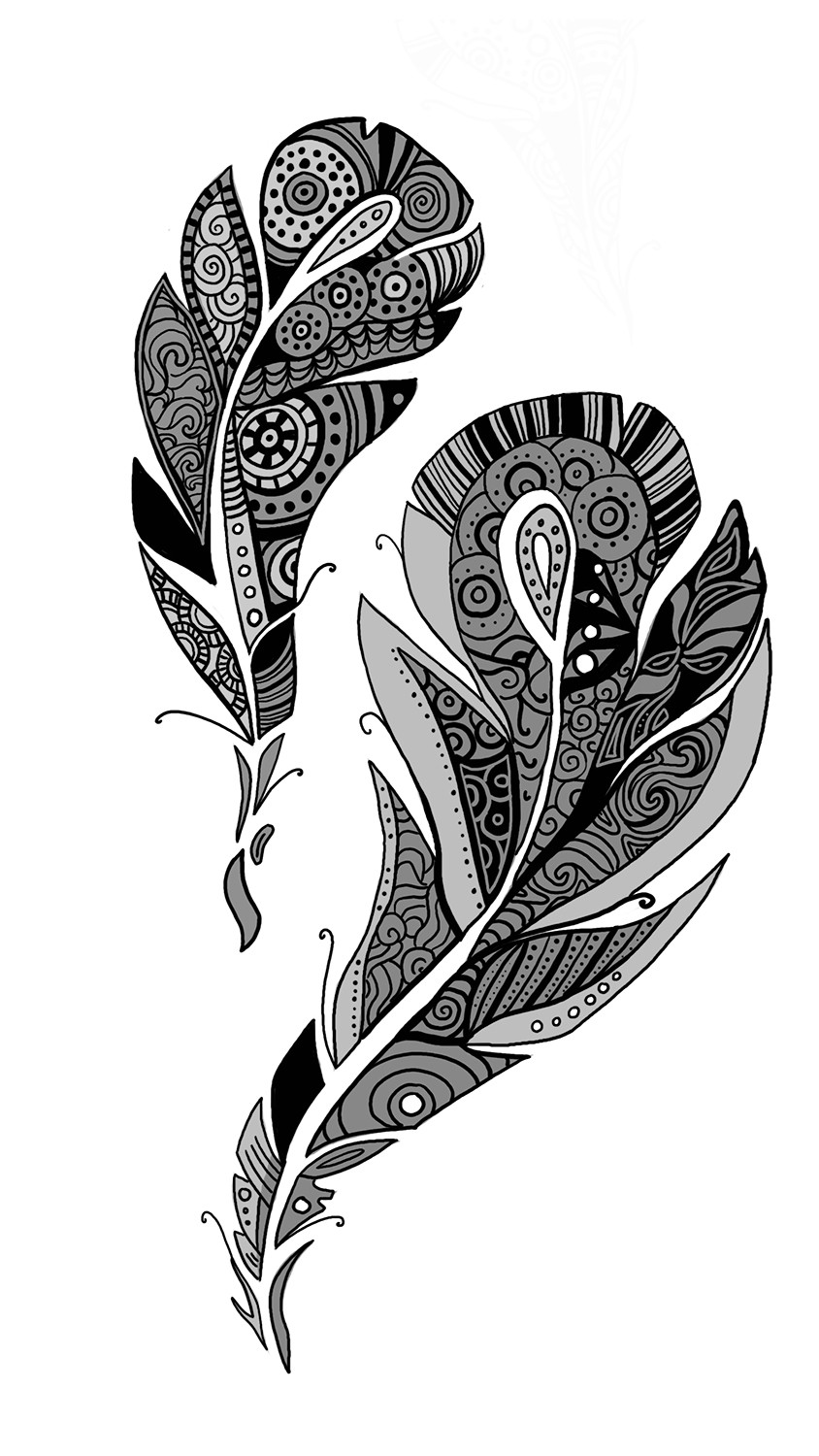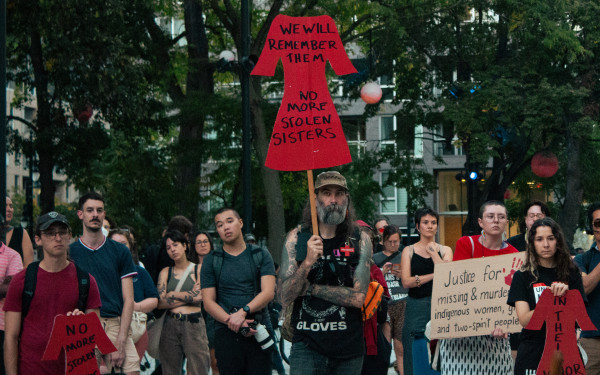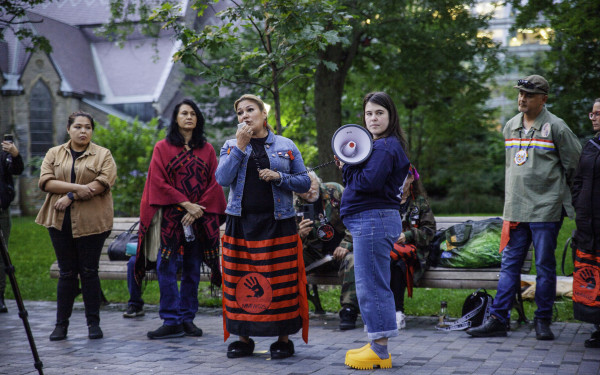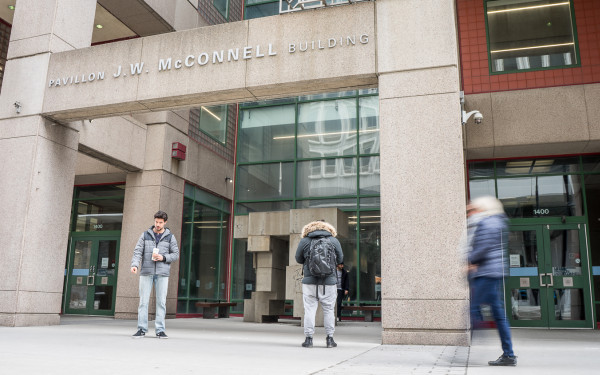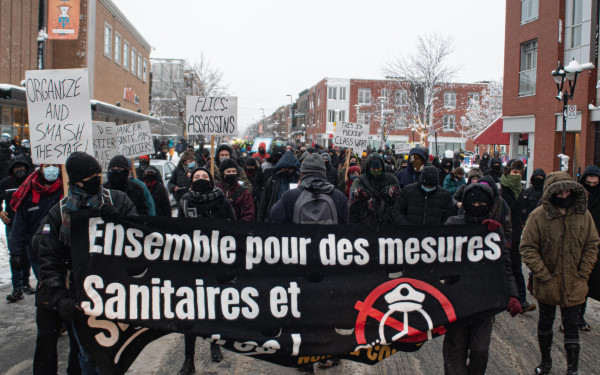Indigenous activists decry lack of government action ahead of 11th annual MMIWG2S vigil
Activists see little progress two years after national inquiry, demand more substantive change
Indigenous leaders and activists in the Quebec community came together in a virtual press conference on Feb. 13 to air their grievances over the lack of progress that Canada has made in regards to Indigenous people’s rights.
The press conference comes ahead of the 11th annual Vigil for Missing and Murdered Indigenous Women, Girls, Trans & 2Spirit Relatives, taking place on Sunday, Feb. 14. This vigil aims to “honour the lives and memories of women, children, two-spirit and non-binary people who have been lost to gendered and racist violence.”
The vigil comes a year and a half after the National Inquiry into Missing and Murdered Indigenous Women and Girls. The national inquiry aimed to investigate and report on the systemic causes of all forms of violence—including sexual violence—against Indigenous women and girls in Canada.
231 recommendations—or “Calls for Justice”—came out of the inquiry. These calls were primarily directed towards federal, provincial and Indigenous governments—some were also directed towards institutions, industries and services such as the police, health-care providers, the media and Correctional Service Canada.
A year and a half after its release, Indigenous speakers at the press conference decried various levels of government for still not coming up with sustained justice measures for the abuses that Indigenous women and girls face.
“[For the National Inquiry] we asked communities to bring out their trauma and now we’re seeing no action whatsoever,” said Jessica Quijano, co-ordinator of the Iskweu Project at the Native Women’s Shelter of Montreal.
She continued on to say that the government has a “lack of political will,” and there has not been adequate progress since the inquiry.
“These things are still happening today. People are going missing every single day,” she said—referencing Donna Paré, an Inuk woman who had been living on the streets of Montreal, who has been missing since December 2018.
Ghislain Picard, Chief of the Assembly of First Nations Quebec-Labrador, echoed this frustration. He said there have been numerous other inquiries and commissions intended to reveal the injustices Indigenous peoples in Canada have faced—including the Viens Commission in 2016, and the Truth and Reconciliation Commission in 2008—but none of them have led to significant change. He stated government inaction as a reason for this.
“It's going on a year and a half now since [the national inquiry] has been made public. We’re still waiting for an action plan,” Picard said. “At this point, I don’t think we can afford any more tears. I don’t think we can afford any more reports, commissions or inquiries.”
Michele Audette, commissioner of the National Inquiry into Missing and Murdered Indigenous Girls, said another impediment to progress is lack of government transparency with their response to the inquiry. She wishes to see exactly which calls for justice have been accepted, which ones have been rejected, and which ones are being currently worked on.
“At this point, I don’t think we can afford any more tears. I don’t think we can afford any more reports, commissions or inquiries.” — Ghislain Picard
The speakers at the press conference emphasized how deeply systemic transformation was still needed in many sectors of Canadian society. They included housing as an example.
Both Quijano and Dayna Danger—who is the Coordinator of the Missing Justice Collective at Concordia’s Centre for Gender Advocacy—stressed that providing adequate housing for houseless Indigenous communities is imperative.
The restorative justice coordinator at the First Peoples Justice Center of Montreal, Amy Edwards, said there is a need “for specific housing spaces for community members who are doing sex work.” She also suggested that there is not enough Indigenous-specific housing for men.
Speakers at the conference also critiqued the police’s response to their concerns.
“The majority of the police force in Quebec are still unaware of the specifics of the cases of the disappearances of Indigenous women despite the protocol that we put in place with the SPVM last year.” said Viviane Michel, President of Quebec Native Women. “Unfortunately, the phenomenon is not yet a thing of the past. There is a staggering number of disappearances that continues to increase.”
Michel went on to state that the increase is evidence that systemic racism exists in the province: “If such a number of non-Indigenous people were disappearing, how would the authorities react?”
Another continuing phenomenon the speakers deplored was the criminalization of Indigenous peoples. Edwards, who is involved in legal and justice work, has become extremely disheartened by the number of Indigenous people she has witnessed come out of the correctional system traumatized.
“[Our conflict resolution] needs to be restorative, it needs to be transformative, it needs to emphasize the healing journeys of community members—not only in [the] present time but intergenerationally too. And not only as an individual but as a person who is a part of a family,” she said.
Danger noted that there is a connection between criminalization and houselessness, and how it increases the injustice Indigenous peoples face.
“Anyone in their house can drink a beer, but if you’re in the street you’re immediately criminalized cause it’s all of a sudden public,” she said. “We should give them a stable place to live instead of a ticket.”
Speakers at the press conference also emphasized the need for different communities to come together to solve these systemic issues.
“Because when we are together we are stronger, and we are more united in our goals,” said Danger.
She intends the vigil to be a “solidarity and meditation space for those who are struggling with the disappearance of a loved one.”
She invites everyone “who finds the colonial and racist situation imposed on Indigenous peoples—which leads to the disappearance of so many women—to join, with respect and compassion” as well.

